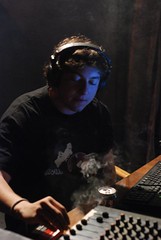What IS the RIAA up to anyway?
What is "hurting" the music industry right now?
 There has been a lot of moving and shaking going on in the music industry over the last few years. Music sales have dropped off dramatically among the major labels. Most major label artists now make more money on tour than from CD sales. In the past, a tour was simply a mechanism to sell more music. This has organizations like the RIAA struggling to keep the revenue stream going. The major labels would now rather develop their own sexy, homogenized artists that they can promote extensively. Instead of seeking out good talent, they are going for the "sure thing" to help them make some money.
There has been a lot of moving and shaking going on in the music industry over the last few years. Music sales have dropped off dramatically among the major labels. Most major label artists now make more money on tour than from CD sales. In the past, a tour was simply a mechanism to sell more music. This has organizations like the RIAA struggling to keep the revenue stream going. The major labels would now rather develop their own sexy, homogenized artists that they can promote extensively. Instead of seeking out good talent, they are going for the "sure thing" to help them make some money.However, music sales are up as a whole (and continue to grow) with the advent of online music sales (such as Apple iTunes) and MP3 players. So if sales are up, why are the labels struggling? They claim that piracy is destroying their business. Does piracy exist? Absolutely. Unfortunately, there is a growing population that believes that music, television, movies, and all forms of media should be FREE. While piracy is out there, I don't believe that piracy is making as big of an impact as they would believe. It becomes a convenient scapegoat for what is really happening to the industry, independent music.
The independent music scene is becoming a major driving force in the industry. Online music sites, MySpace, podcasting, and the like are dramatically leveling the playing field of music promotion. No longer do musicians need to pay the radio conglomerates for the CHANCE to have their music promoted. Musicians can now do this themselves on the internet through all forms of new media. Suddenly, the major labels have lost their virtual monopoly on music promotion, and independent music is making severe dents in the pockets of the major labels.
Internet radio waves
 The biggest controversy in the music world right now centers around the dramatic rise in licensing rates that the RIAA wants to charge internet radio stations. The price increase is retroactive to 2006 and has the very real potential to put many internet radio stations out of business. Everyone is screaming about the new rates and how it will kill off hurt internet radio. While the retroactive rates alone could put many out of business, those that emerge from that chaos will need to adapt to the new rates. In a post I made a few months back, I saw this as a huge plus for independent music. To compensate for increased royalties, internet radio will look much more seriously at independent music. Can't pay the RIAA? How about low cost independent and small label music?
The biggest controversy in the music world right now centers around the dramatic rise in licensing rates that the RIAA wants to charge internet radio stations. The price increase is retroactive to 2006 and has the very real potential to put many internet radio stations out of business. Everyone is screaming about the new rates and how it will kill off hurt internet radio. While the retroactive rates alone could put many out of business, those that emerge from that chaos will need to adapt to the new rates. In a post I made a few months back, I saw this as a huge plus for independent music. To compensate for increased royalties, internet radio will look much more seriously at independent music. Can't pay the RIAA? How about low cost independent and small label music?Unfortunately, very few saw through the smoke-screen that the new royalty rates created. A part of this bill included the ability for SoundExchange (a part of the RIAA) to collect compulsory royalties on all music played over the internet. What this essentially means is that the RIAA will now have the right to collect royalties from independent music, even if they are not a part of the RIAA. What's more, SoundExchange does not need to contact the artists that they collected money on their behalf, and musicians can't even GET the money unless they become a member of the RIAA. If the money goes unclaimed for 3 years, SoundExchange gets to keep it. So what we have here are the major labels (who make up the RIAA) getting some of that pie back that independent music took away. Suddenly, the idea of internet radio stations switching to indie music to get around the royalty increase is now voided.
While it remains to be seen just how far SoundExchange will take their new royalty template, I'm deeply concerned that one of the mechanisms that will fall under this new license umbrella is podcasting (which is becoming a huge launch pad for many independent artists). The license set forth by the Podsafe Music Network, IODA Promonet, and others would seem to cover podcasters from these royalties. Unfortunately, the wording suggests otherwise. This "exception clause" may need to be filed on a per-artist or even per-song basis directly with SoundExchange. The wording is so vague, these compulsory licenses could be taken to nearly ANY site the streams music over the internet, including sites like MySpace or places that sell music. Suddenly, faced with new license fees, independent music starts to loose it's primary promotion mechanism, the internet. Independent musicians will need to make a concerted effort to file an exception to SoundExchange if they want to maintain their promotion through the internet medium.
More moves by the RIAA
News today, relayed by Steve from the Wicked Good Podcast, suggests that the RIAA may be looking to take those same performance royalty rates to terrestrial radio. While I don't know of any specific legislation that is pending, the idea of identical pricing and compulsory royalties being shoved through terrestrial radio is very real. I believe that the battle at the internet radio level was just precedence-setting for their push to get more money out of terrestrial radio (where the real performance royalty money is). Much larger audiences with very poor ways to measu
 re actual listeners. Maintaining the compulsory royalty clause in this case will simply cut back the tendency for stations to step into the independent music scene, or at least slow its progress.
re actual listeners. Maintaining the compulsory royalty clause in this case will simply cut back the tendency for stations to step into the independent music scene, or at least slow its progress.Only time will tell what is going to happen to the music industry as a whole in the next few years. The music industry is changing, and will likely look very different 5-10 years from now. I'm just thankful that I have discovered the wealth of independent music out there, and I'm thankful that I can promote some incredible music and musicians. I'm not sure what the future holds, but I'm still going to do my best to promote what's out there. I guess to be truthful... I'd gladly pay royalties to people like Matthew Ebel, Kevin Reeves, Geoff Smith and others because I believe in their music. I just wish I had the finances to do more...




 Digg/mesoed
Digg/mesoed Flickr/kcweather
Flickr/kcweather Myspace/lookingoutthewindow
Myspace/lookingoutthewindow Facebook/Ed Roberts
Facebook/Ed Roberts Linkedin/eroberts
Linkedin/eroberts Twitter/edroberts
Twitter/edroberts YouTube/mesoed
YouTube/mesoed Del.icio.us/mesoed
Del.icio.us/mesoed Technorati/mesoed
Technorati/mesoed Blog/Ed Roberts
Blog/Ed Roberts
2 comments:
For musicians looking to get into podcasting. Check out my free report at www.promotingwithpodcasting.com
Dave Jackson
Musicians Cooler
www.musicianscooler.com
HA! Nice bit of pseudo-spam there Dave. But I often refer people to that document and to your podcast, so it's all good...
Post a Comment